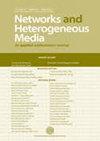Influence maximization in social networks using role-based embedding
IF 1.3
4区 数学
Q3 MATHEMATICS, INTERDISCIPLINARY APPLICATIONS
引用次数: 0
Abstract
Influence maximization (IM), a central issue in optimizing information diffusion on social platforms, aims to spread posts or comments more widely, rapidly, and efficiently. Existing studies primarily focus on the positive effects of incorporating heuristic calculations in IM approaches. However, heuristic models fail to consider the potential enhancements that can be achieved through network representation learning techniques. Some recent work is keen to use representation learning to deal with IM issues. However, few in-depth studies have explored the existing challenges in IM representation learning, specifically regarding the role characteristics and role representations. This paper highlights the potential advantages of combining heuristic computing and role embedding to solve IM problems. First, the method introduces role granularity classification to effectively categorize users into three distinct roles: opinion leaders, structural holes and normal nodes. This classification enables a deeper understanding of the dynamics of users within the network. Second, a novel role-based network embedding (RbNE) algorithm is proposed. By leveraging the concept of node roles, RbNE captures the similarity between nodes, allowing for a more accurate representation of the network structure. Finally, a superior IM approach, named RbneIM, is recommended. RbneIM combines heuristic computing and role embedding to establish a fusion-enhanced IM solution, resulting in an improved influence analysis process. Exploratory outcomes on six social network datasets indicate that the proposed approach outperforms state-of-the-art seeding algorithms in terms of maximizing influence. This finding highlights the effectiveness and efficacy of the proposed method in achieving higher levels of influence within social networks. The code is available at https://github.com/baiyazi/IM2.利用基于角色的嵌入实现社交网络中的影响力最大化
影响最大化是优化社交平台信息传播的核心问题,其目的是使帖子或评论更广泛、更快速、更有效地传播。现有的研究主要集中在将启发式计算纳入IM方法的积极影响上。然而,启发式模型没有考虑到通过网络表示学习技术可以实现的潜在增强。最近的一些工作热衷于使用表征学习来处理IM问题。然而,很少有深入的研究探讨即时消息表征学习中存在的挑战,特别是在角色特征和角色表征方面。本文强调了将启发式计算和角色嵌入相结合来解决IM问题的潜在优势。首先,该方法引入角色粒度分类,将用户有效地划分为意见领袖、结构洞和正常节点三种不同的角色。这种分类可以更深入地了解网络中用户的动态。其次,提出了一种新的基于角色的网络嵌入算法。通过利用节点角色的概念,RbNE捕获节点之间的相似性,从而允许更准确地表示网络结构。最后,推荐一种更高级的IM方法,称为RbneIM。RbneIM结合了启发式计算和角色嵌入,建立了融合增强的IM解决方案,从而改进了影响分析过程。在六个社交网络数据集上的探索性结果表明,所提出的方法在最大化影响方面优于最先进的播种算法。这一发现突出了所提出的方法在社会网络中实现更高水平影响力的有效性和功效。代码可在https://github.com/baiyazi/IM2上获得。
本文章由计算机程序翻译,如有差异,请以英文原文为准。
求助全文
约1分钟内获得全文
求助全文
来源期刊

Networks and Heterogeneous Media
数学-数学跨学科应用
CiteScore
1.80
自引率
0.00%
发文量
32
审稿时长
6-12 weeks
期刊介绍:
NHM offers a strong combination of three features: Interdisciplinary character, specific focus, and deep mathematical content. Also, the journal aims to create a link between the discrete and the continuous communities, which distinguishes it from other journals with strong PDE orientation.
NHM publishes original contributions of high quality in networks, heterogeneous media and related fields. NHM is thus devoted to research work on complex media arising in mathematical, physical, engineering, socio-economical and bio-medical problems.
 求助内容:
求助内容: 应助结果提醒方式:
应助结果提醒方式:


